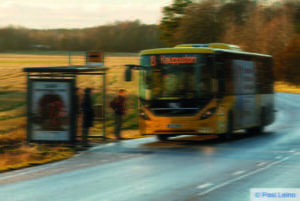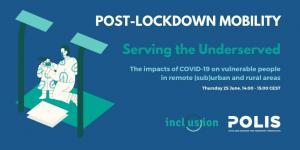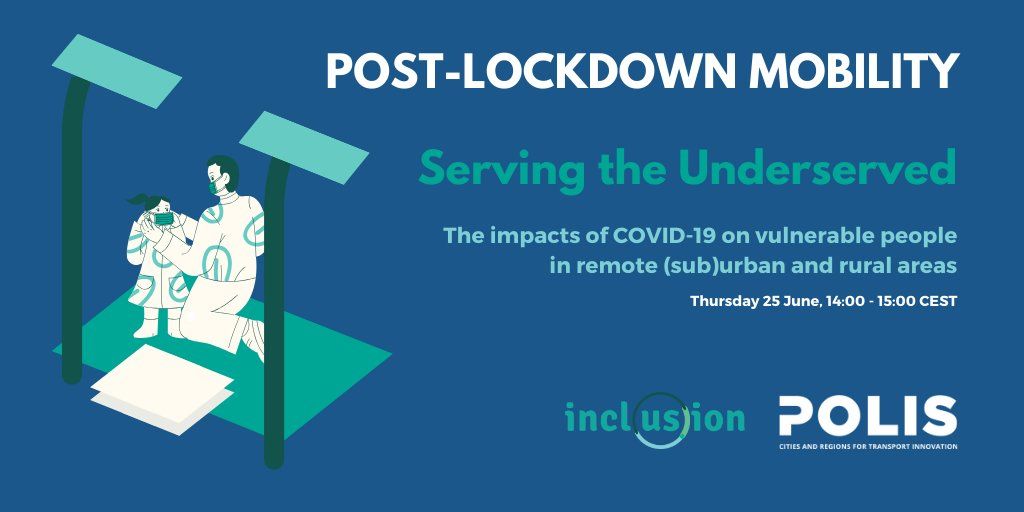Post-Lockdown Mobility: Serving the Underserved
Hosted in collaboration with the EU-funded INCLUSION project
This webinar, hosted by Pasquale Cancellara, Project and Membership Manager at POLIS, investigated how the COVID-19 pandemic has affected vulnerable people living in remote (sub)urban and rural areas with limited mobility services. Accessibility in rural areas is often overlooked, but providing inclusive and frequent services for rural and suburban communities is vital. What does the future hold for this important issue?
Karel Martens, Associate Professor at the Faculty of Architecture and Town Planning, Technion – Israel Institute of Technology (Haifa, Israel)
Historically, the planning of transport services has been viewed through a paradigm of ‘supply and demand’ where more supply is created where demand exists. However, Karel noted how this should not be the way our transport systems are planned. Instead, transport planning should be centred on providing access to services, goods and communities to give people the freedom to choose how and when they travel. There is a strong role for local and national governments to play here, intervening where necessary to ensure that everyone’s mobility needs are being met. All too often transport services fail to provide access for everyone; for example, bus services are cut because of low demand or bike lanes are not constructed because of low demand. This approach needs to be changed to ensure that everyone’s mobility needs are met, regardless of age, income or other factors.
Karel focused on the issue of ‘transport justice’, which sets out that everyone must have a sufficient level and availability of transport so that the benefits of society can be enjoyed by all. Using the case of Amsterdam, Karel highlighted how access to services and jobs are enjoyed most by high-income groups with access to private cars, whilst people without access to cars have poorer access to services and employment and experience longer travel times. This demonstrates how at present, transport systems - even in cities like Amsterdam are not meeting the needs of everyone in society.
Karel closed by setting out four policy recommendations to better serve the underserved in society. Firstly, cuts to public  transport services should be restricted to high-frequency routes where public transport is most available. A balance should, however, be struck to ensure that crowding of services is avoided, as this may lead to a fear or mistrust of public transport. Secondly, the frequency of public transport should be increased in ‘hotspot’ areas, such as in areas of low car access and low-income areas. This should be coupled with public transport priority infrastructure on these routes. Thirdly, off-peak public transport costs should be reduced to stimulate a more even spread of travel across the course of a day, helping to ease crowding of services at peak times. Finally, to reduce the exposure of high-risk groups to COVID-19, alternatives to public transport should be provided for vulnerable people, such as taxi vouchers, for instance.
transport services should be restricted to high-frequency routes where public transport is most available. A balance should, however, be struck to ensure that crowding of services is avoided, as this may lead to a fear or mistrust of public transport. Secondly, the frequency of public transport should be increased in ‘hotspot’ areas, such as in areas of low car access and low-income areas. This should be coupled with public transport priority infrastructure on these routes. Thirdly, off-peak public transport costs should be reduced to stimulate a more even spread of travel across the course of a day, helping to ease crowding of services at peak times. Finally, to reduce the exposure of high-risk groups to COVID-19, alternatives to public transport should be provided for vulnerable people, such as taxi vouchers, for instance.
Karel closed by stating that serving the underserved is very easy when one considers that the vast majority of transport budgets at a local and national level are spent on serving those groups who are already very well served. “Serving the underserved” will be possible only through a paradigm shift in transport that moves from planning focused on transport networks to people-centred planning, in other words, on the people who use the networks. Placing a greater priority on underserved groups in transport planning will deliver societal gains and ensure that everyone can enjoy the benefits of society.
Lucie Kirstein, Policy Analyst at International Transport Forum, OECD and project lead for the Working Group on “Innovative Mobility for the Periphery”
COVID-19 has hit poor, disadvantaged communities with poor transport accessibility in many cases. In rural areas, issues have arisen around access to healthcare and services during this challenging time. These communities struggle to access information, face longer delivery times and longer times for testing. Additionally, COVID-19 has disrupted vital social support networks in rural communities.
COVID-19 has exposed additional inequalities in transport. At the start of the virus outbreak, many front-line transport workers were often not equipped with protective gear. Additionally, many people in society rely on public transport as a lifeline service to access services and employment. During this period of reduced public transport availability, these people have struggled to access the basic services that they require. Whilst teleworking has become commonplace during COVID-19, many people in semi-dense or rural areas are not able to work from home due to the nature of employment in these areas.
Lucie noted how there needs to be a new focus on inclusive mobility going forward. Efforts should be made to improve knowledge of the needs of different groups in society, such as by income, gender, ethnicity or geography to better target mobility support for certain groups. Essential deliveries and care services need to be maintained even in these challenging times for public transport. This may require financial support from the local or national government.
Looking forward, Lucie identified points important for the long-term focus for inclusive accessible mobility. Firstly, a better understanding of the accessibility needs of different groups in society is needed. Precise targets and objectives for inclusion are needed in government programmes and projects. Better use of technology is needed to achieve a shift towards people-centred transport solutions. Finally, a participatory approach should be taken in planning and marketing rural transport services.
Angelo Meuleman, Expert on Shared and Connected Mobility at Taxistop and Co-founder of Mobipunt
Angelo reflected on the experiences and needs of elderly groups in society in planning accessible transport systems. Angelo asked us to imagine the experience of ‘Berta’, an elderly woman living in a small town in Belgium. When she needs  to travel she is unable to take the bus due to a lack of services, she can’t drive or use a bike due to her age. However, she still needs to access transport to go to the shops and see friends. Angelo explained how community transport services are being used in Belgium to support people in this position. Volunteer drivers, who are often retired professional drivers, use their own cars as part of community service to support elderly people with additional mobility needs who may be socially isolated. This service is provided in remote areas with support from local municipalities and local NGOs. The EU-funded project INCLUSION in which Taxistop is involved with a pilot lab in Flanders, gave also more insights in the use of technology for such a service, on how the users’ experience could be improved and it helped to recruit more volunteer drivers. Angelo noted how COVID-19 has hit old people the hardest, with this group most at risk of infection. And if they were not hit by COVID-19 directly, they were hit mentally.
to travel she is unable to take the bus due to a lack of services, she can’t drive or use a bike due to her age. However, she still needs to access transport to go to the shops and see friends. Angelo explained how community transport services are being used in Belgium to support people in this position. Volunteer drivers, who are often retired professional drivers, use their own cars as part of community service to support elderly people with additional mobility needs who may be socially isolated. This service is provided in remote areas with support from local municipalities and local NGOs. The EU-funded project INCLUSION in which Taxistop is involved with a pilot lab in Flanders, gave also more insights in the use of technology for such a service, on how the users’ experience could be improved and it helped to recruit more volunteer drivers. Angelo noted how COVID-19 has hit old people the hardest, with this group most at risk of infection. And if they were not hit by COVID-19 directly, they were hit mentally.
Drivers used in these communities are also at risk, given that they are usually retired. To support older people at this challenging time, temporary solutions are being rolled out in remote areas. Some local shopping services have been re-opened, personal visits and follow-ups are taking place for isolated older people. There was a high demand for support for older groups such as the volunteer driving service, but people in local communities have risen to the challenge to offer support. This type of transport offer shows its human aspect which is very important for this type of target groups. Probably a bus or a taxi driver does not call their passengers at home to know how they feel but voluntary drivers do and this means a lot for elderlies. During the crisis, the service has shown how important is the role of a transport service operated by real persons that have empathy and which could not be replaced by algorithms or automation.
Angelo closed by reflecting on some lessons for accessibility in mobility post-lockdown. In particular, there should be a shift from seeing transport as just about moving people to better reflecting the social aspects of transport. For the elderly, mainly in rural areas, transport is not always about the purpose of the destination. Transport is often about escaping from isolation and loneliness. The social aspects of transport are particularly important for older groups in society.
You can watch back this webinar and view all presentations here.




